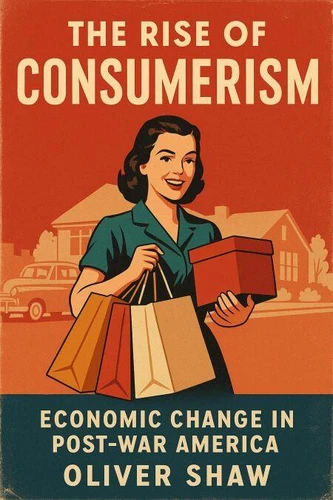The Rise of Consumerism: Economic Change in Post - War America
Par :Formats :
Disponible dans votre compte client Decitre ou Furet du Nord dès validation de votre commande. Le format ePub est :
- Compatible avec une lecture sur My Vivlio (smartphone, tablette, ordinateur)
- Compatible avec une lecture sur liseuses Vivlio
- Pour les liseuses autres que Vivlio, vous devez utiliser le logiciel Adobe Digital Edition. Non compatible avec la lecture sur les liseuses Kindle, Remarkable et Sony
 , qui est-ce ?
, qui est-ce ?Notre partenaire de plateforme de lecture numérique où vous retrouverez l'ensemble de vos ebooks gratuitement
Pour en savoir plus sur nos ebooks, consultez notre aide en ligne ici
- FormatePub
- ISBN8230547068
- EAN9798230547068
- Date de parution19/04/2025
- Protection num.pas de protection
- Infos supplémentairesepub
- ÉditeurIndependently Published
Résumé
The Rise of Consumerism: Economic Change in Post-War America by Oliver Shaw explores the profound economic and cultural transformation of the United States in the years following World War II. The book examines how the post-war economic boom gave birth to a consumer-driven society, reshaping American life, social structures, and individual identities. Shaw delves into the role of mass production, advertising, and technological innovation in driving a consumer revolution, while also addressing the implications of the new emphasis on material wealth.
The book reflects on how the idealized American Dream of homeownership, suburban life, and material success became intertwined with the rise of consumerism. At the same time, it critiques the environmental and social costs of this new economic order, considering the long-term effects of overconsumption and the challenges posed by an ever-expanding consumer economy. Through a rich historical analysis, Shaw provides insight into the forces that shaped modern American consumer culture, offering a deeper understanding of its impact on society, politics, and the economy.
The book reflects on how the idealized American Dream of homeownership, suburban life, and material success became intertwined with the rise of consumerism. At the same time, it critiques the environmental and social costs of this new economic order, considering the long-term effects of overconsumption and the challenges posed by an ever-expanding consumer economy. Through a rich historical analysis, Shaw provides insight into the forces that shaped modern American consumer culture, offering a deeper understanding of its impact on society, politics, and the economy.
The Rise of Consumerism: Economic Change in Post-War America by Oliver Shaw explores the profound economic and cultural transformation of the United States in the years following World War II. The book examines how the post-war economic boom gave birth to a consumer-driven society, reshaping American life, social structures, and individual identities. Shaw delves into the role of mass production, advertising, and technological innovation in driving a consumer revolution, while also addressing the implications of the new emphasis on material wealth.
The book reflects on how the idealized American Dream of homeownership, suburban life, and material success became intertwined with the rise of consumerism. At the same time, it critiques the environmental and social costs of this new economic order, considering the long-term effects of overconsumption and the challenges posed by an ever-expanding consumer economy. Through a rich historical analysis, Shaw provides insight into the forces that shaped modern American consumer culture, offering a deeper understanding of its impact on society, politics, and the economy.
The book reflects on how the idealized American Dream of homeownership, suburban life, and material success became intertwined with the rise of consumerism. At the same time, it critiques the environmental and social costs of this new economic order, considering the long-term effects of overconsumption and the challenges posed by an ever-expanding consumer economy. Through a rich historical analysis, Shaw provides insight into the forces that shaped modern American consumer culture, offering a deeper understanding of its impact on society, politics, and the economy.






















